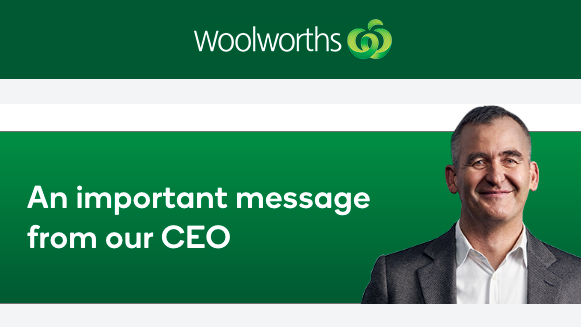Brands: Stop with the well-meaning COVID-19 emails
The influx of emails in the past week has been brands' version of queuing at the supermarket for a pack of toilet paper, Hamish Cargill says. You don’t need to do it, but since everyone else is, you feel obliged to join in.
Last week, rather than working productively, half of Australia’s white-collar workforce spent their week working from home ploughing through an inbox full of well-meaning emails from every brand they’ve ever engaged with.
It was, to use the word of 2020, an ‘unprecedented’ waste of the nation’s time. Time that could be better spent making hand sanitiser, or finding the ideal Zoom angle.
And it wasn’t just the readers’ time. Consider the process behind the development of these emails, from first draft through to the 17-person scrum of earnest folks across legal and corporate comms who had to approve every wasted word.

It started with the Woolworths email
Like coronavirus, it started slowly and in one place. An email from Woolworths’ CEO Brad Banducci the previous Friday:
“These remain challenging times and with the situation evolving, I’d like to share what Woolworths is doing to support our customers, team members and the community.”
What followed was an important message of reassurance about what Woolies is doing to address the rush in their stores, and the shortage of stock. Empathetic, caring, detailed – it laid things out clearly, giving answers to questions people were actually asking.
Over that weekend, the corporate comms teams of Australia must have all agreed the Woolworths email was good, because they started copying it immediately. By Tuesday, every organisation in Australia had a team behind the keyboards creating their own version of that email.
Here’s the basic structure.
Dear Hamish,
[Show empathy and care]
In these uncertain and challenging times, our focus is on protecting the health, wellbeing and safety of our people and customers.
[Demonstrate that you’re aware of the fact you really know as little as anyone else]
The COVID-19 situation continues to evolve rapidly. As we all continue to navigate through these unprecedented times, we want you to know that [insert brand] is here for you.
[Say something about how your organisation has dealt with hard times before]
In [insert years in business], we’ve stood up to many challenges. While this may be the most serious yet, we want you to know it will not get in the way of our commitment to providing you with the service you expect.
[Preach a little about the value of community]
By coming together as a community, we can navigate these waters and help those most vulnerable with generosity and kindness.
[Make lightweight point about business continuity]
This week, we made the responsible decision to close our [office/ factory/ warehouse] for the health of our people and customers. We are an agile, close-knit and collaborative organisation, and our team have made a seamless transition to working from home.
[Subtly tout for business]
Our expert team stand ready to help you with [insert product or service], in the same safe and secure way you’ve come to expect.
[Finish on a personal note and be a bit bossy]
Our thoughts are with you and your family as we navigate these uncertain times.
We encourage you to be aware of how you can avoid contributing to the spread, listening to the recommendations set by the authorities.
Take care and be kind.
Let me say now that, in principle, there’s absolutely nothing wrong with connecting with your contact list. In fact, at times like this, you should be connecting with them.
But most of these emails have been unnecessarily long, wordy, and undisciplined.
Most critically, few of them had a point to make. The rush to communicate over the past week has been the business version of queuing at the supermarket for a pack of toilet paper. You don’t need any, but since everyone else is jostling for space, you feel obliged to join in.
In the face of this sort of challenge, it’s more important than ever for organisations to distinguish themselves. Resist the temptation to join the herd, and deliver the difference that’s given you this hard-earned audience in the first place. Stay focused on the fact that words aren’t free. You’re only granted a limited quota in the minds of your audience, so be sure to use them wisely – in a way that benefits your customer first, and your organisation next.
So, before you flood the nation’s inboxes, consider what it is you actually have to say. Why is it important for your mailing list to hear from you at this time? What relevant information do you have to convey? And how can you add value to their lives when all around them the noise is overwhelming?
Finally, match the tone of your words to the time, but deliver the message in your way, with your style (understanding your style is work you should have done when things were good).
Be yourself. And remember to wash your hands.

Hamish Cargill is the director of brand communications agency XXVI




“. . . few of them had a point to make.”
Sums up most corporate emails.
User ID not verified.
Brilliant article. Well said.
User ID not verified.
Well said, Hamish, and as a result I haven’t read most of these emails.
But I would say that if you don’t demonstrate what you’re doing about the situation, your clients will think it strange and probably ask you. Especially when you’re a small company serving multinational clients, you are tacitly expected to act like a multinational.
So, I’m with you – strike the balance between empathy and a practical demonstration of your actions.
User ID not verified.
Hit the nail on the head. I saw someone on LinkedIn sum up the three groups of emails. 1) getting emails when you bought a $5 item 5 years ago. 2) Emails that just talk about how they’re helping employees which is nice to have but of little value as a customer. and the more useful 3rd) if there is impact to your business operations, or you need support or if there’s actual impact. If there’s no impact, don’t email.
User ID not verified.
Pretty much most advertising these days – start with a solution (in this case an email) without first addressing what problem (if any) you are actually solving.
User ID not verified.
Hhmmm,
Decent article Hamish.
I wonder how these sort of Corporate emails will be taken in the weeks to come. When we see tens of thousands of hard working people joining the unemployment cues. There will still be the many big Corporate businesses that can afford to support their employees as the WFH. Then – there are many many more, that cannot support their hard working, loyal employees – and end up having to stand them down, often without pay.
Will we see “empathy emails” from Corporate Australia then – Telstra, Woolworths, Banks, Insurance Companies – and the like. What will their messages of support be then?
User ID not verified.
… the never-ending emails from Luxury Escapes and Trip-A-Deal in the middle of a lock-down.
Just plain stupid.
But thank God I can still have a haircut.
User ID not verified.
Im not sure you can knock someone for trying todo something good.Thats important right now.
User ID not verified.
Totally agree! I also unlinked a number of contacts on LinkedIn because of this poorly placed self promotions. Poor form!
User ID not verified.
Great article, couldn’t agree more, I tried to reply to a couple of them, they had a non-reply email address, just shows you how sincere the email was.
User ID not verified.
You have just done the same thing only with a slightly elevated sense of self importance. Do us all a favour and just resist the temptation to contribute nothing of value.
User ID not verified.
I think what’s being said here is to be disciplined about what that ‘something good’ is and getting to that point directly
User ID not verified.
Free advice – segment your database into three audiences:
1. Loyal customers: email them anything they need to know that will impact them
2. One-off customers: don’t email them
3. People on the database that aren’t customers: don’t email them
You’re welcome.
User ID not verified.
Bingo.
User ID not verified.
I appreciate the sentiment of this article and also agree with all comments here too above – the good ones and the negative ones both.
I’ve had way too many ‘policy’ emails that I too think are a waste of time and mean nothing, and don’t impact me at all.
In a time like this we need to be real and we need to make sure we don’t waste people’s time and at the same time spit in the face of people really in hardship too.
All realities are right here though. There will be no one solution.
It would be nice if opinion pieces on Mumbrella had some useful ‘How To’s’ as opposed to ‘How Not To’s’ as this article is phrased. I think we all need to be valuable, useful and with respect at this time rather than some blanket bagging out.
Hence my favourite response goes to @Paolo above with the split of the database.
Oh, and if your customers really are impacted by your decision then something bigger than an email is probably in order. I saw a good video with a heartfelt message for a conference that was cancelled and felt that was of value. It also explained how the alternative solution was going to work too.
If it is a bigger impact again then a personal call is even necessary.
Definitely need to delicately balance that fine line between empathy and capitalism though.